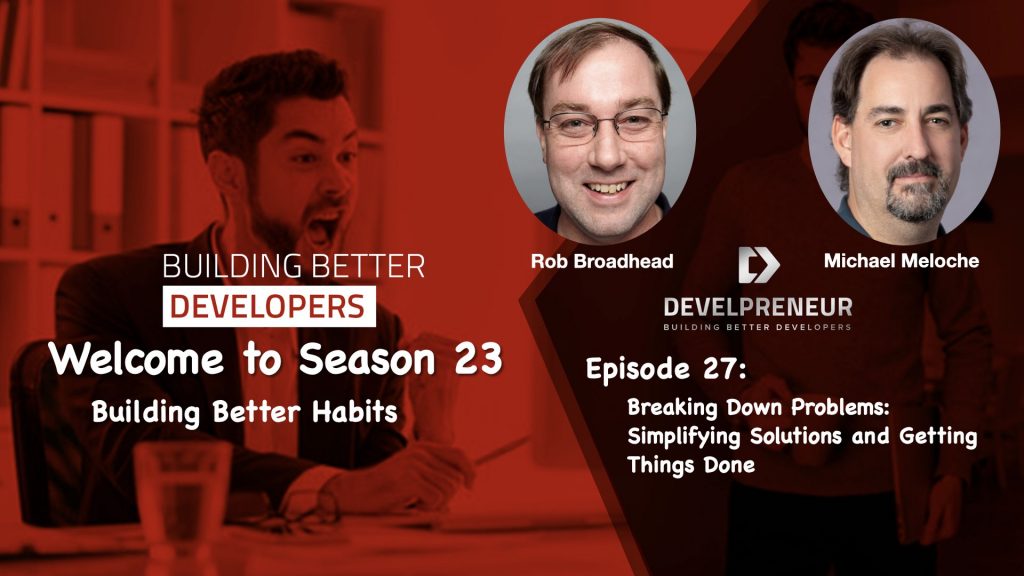In this episode of Building Better Habits, hosts Rob Broadhead and Michael Meloche explore the art of breaking down complex problems, simplifying tasks, and mastering productivity. Whether you’re a developer, a project manager, or simply someone looking to boost efficiency, these insights are practical, actionable, and transformative.
Breaking Down Problems: The Key to Starting Smart
One of the most common mistakes developers make is diving into a task without first breaking it down. According to Rob and Michael, this “rush-in” approach often leads to frustration, wasted time, and incomplete work.
Michael shares how many developers, when handed a ticket or task, immediately jump to coding without understanding the full scope. This can turn a seemingly simple task into a complicated ordeal. By breaking down problems into manageable pieces, you create clarity, uncover hidden challenges, and make the task feel far less overwhelming.
Before starting any task, take 15–30 minutes to analyze it. Ask yourself:
- What’s the end goal?
- What are the key steps required?
- Are there dependencies or potential roadblocks?
This approach prevents surprises and ensures you’re solving the right problem from the start.
Simplifying Tasks by Breaking Down Problems
Simplifying a problem is essential to completing it efficiently. Rob and Michael emphasize that developers should view tasks like recipes: each step must be clear, each ingredient (requirement) accounted for, and the process should be simplified as much as possible.
Rob likens this to using a slow cooker: planning ahead is crucial. If you wait until the last minute, achieving the desired outcome is impossible. Similarly, if a task includes ambiguities or allows for multiple solutions, you need to refine the scope before diving in.
Try writing out the steps to complete the task, as if creating a checklist or test plan. If you encounter vague instructions or multiple paths to the solution, stop and seek clarification. A well-defined task leads to focused, effective work.
How Breaking Down Problems Helps You Get Things Done
Once a problem is broken down and simplified, execution becomes much smoother. Rob recommends combining this strategy with productivity techniques like the Pomodoro method, where you work in short, focused intervals.
For long-term projects, breaking tasks into milestones and distributing them evenly over time helps avoid the “feast or famine” cycle. Consistently chipping away at tasks not only maintains balance but also prevents burnout.
Michael highlights another critical point: when starting a task, always reread the requirements to ensure they’re still relevant. If system changes or new updates render part of the task obsolete, addressing this before starting can save hours of wasted effort.
Before beginning a task:
- Visualize the end result.
- Identify the key milestones.
- Break it into actionable steps.
By doing this, you ensure progress and minimize the risk of backtracking.
Building the Habit of Breaking Down Problems
Developing the habit of breaking down problems takes conscious effort, but the rewards are immense. Rob suggests starting small. Even routine tasks like laundry, cooking, or grocery shopping can benefit from this structured approach.
For example:
- Task: Doing laundry.
- Steps:
- Gather clothes.
- Sort them by color and fabric type.
- Load the washing machine.
- Dry, fold, and put away.
This methodical breakdown makes even mundane tasks feel manageable and reinforces the habit of structured thinking.
Challenge Yourself: Breaking Down Problems Every Day
Rob proposes a simple challenge to help build this habit: for the next week, before starting any task, write down the steps required to complete it. Whether it’s a 15-minute errand or a multi-day project, this exercise will improve your focus and efficiency.
Final Thoughts
Breaking down problems, simplifying tasks, and planning your approach are essential skills for anyone looking to enhance productivity. Rob and Michael remind us that this habit not only improves efficiency but also reduces stress and creates a smoother workflow.
Start small, stay consistent, and watch as these habits transform your ability to tackle challenges.
What’s Next?
Join the conversation! Share your experiences with breaking down problems by reaching out to the Building Better Habits team. Whether you have success stories or suggestions for future episodes, they’d love to hear from you.
Let’s keep building better habits, one step at a time!
Stay Connected: Join the Develpreneur Community
We invite you to join our community and share your coding journey with us. Whether you’re a seasoned developer or just starting, there’s always room to learn and grow together. Contact us at [email protected] with your questions, feedback, or suggestions for future episodes. Together, let’s continue exploring the exciting world of software development.

